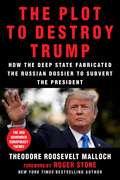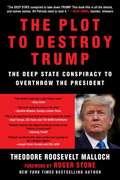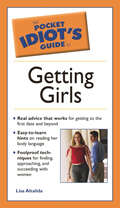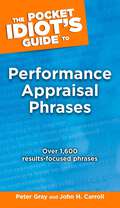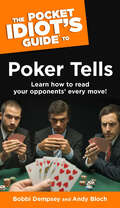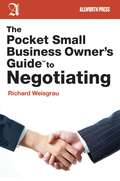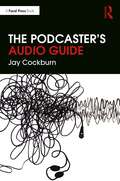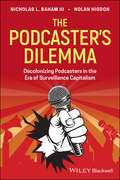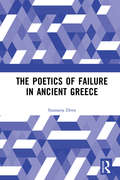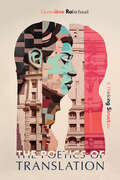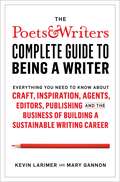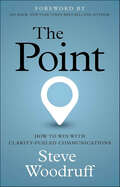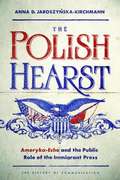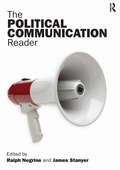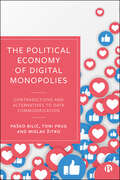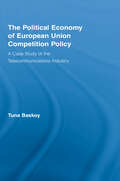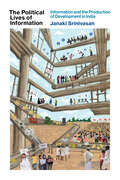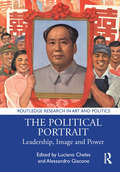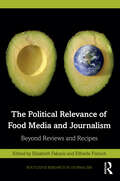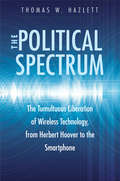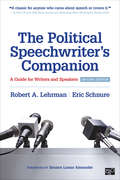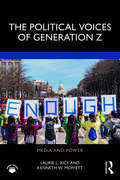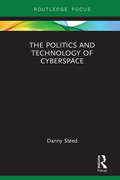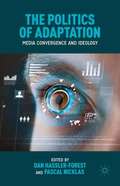- Table View
- List View
The Plot to Destroy Trump: How the Deep State Fabricated the Russian Dossier to Subvert the President
by Theodore Roosevelt Malloch Roger Stone“The DEEP STATE conspired to take down TRUMP. This book fills in all the details, and names names. All Patriots need to read it.” ?Alex Jones, founder, InfowarsThe Plot to Destroy Trump exposes the deep state conspiracy to discredit and even depose the legitimately elected President Donald J. Trump with the fabricated Russian dossier, including: How the unsubstantiated accusations of collusion began with former MI6 agent Christopher Steele, Fusion GPS, and the Democratic National Convention on behalf of Hillary Clinton The opportunistic role played by Russia’s FSB and former KGB agents, according to Putin’s strategy to create chaos in the West Wikileaks, along with Fake News Award–winner CNN, BuzzFeed, and the other liberal media that all played a part in pushing the information to the American people The compromised CIA and FBI personnel who took the dossier and ran with it, despite knowing it was unverified The roles that George Papadopoulos, Carter Page, Bruce and Nellie Ohr, Paul Singer, Paul Manafort, and the Podesta brothers played?or did not play?in the conspiracy against the presidentHow does all this tie together? And what does it mean for Trump’s presidency and American democracy? Ted Malloch names the players, connects the dots, and explains who was behind the plot to create a red November. With a foreword by New York Times bestseller and Trump confidant Roger Stone, The Plot to Destroy Trump uncovers the biggest political scandal since Watergate.
The Plot to Destroy Trump: The Deep State Conspiracy to Overthrow the President
by Theodore Roosevelt Malloch“The DEEP STATE conspired to take down TRUMP. This book fills in all the details, and names names. All Patriots need to read it.” Alex Jones, founder, Infowars With a new afterword, updated from its hardcover edition, The Plot to Destroy Trump exposes the deep state conspiracy to discredit and even depose the legitimately elected President Donald J. Trump with the fabricated Russian dossier, including: How the unsubstantiated accusations of collusion began with former MI6 agent Christopher Steele, Fusion GPS, and the Democratic National Convention on behalf of Hillary Clinton The opportunistic role played by Russia’s FSB and former KGB agents, according to Putin’s strategy to create chaos in the West Wikileaks, along with Fake News Award–winner CNN, BuzzFeed, and the other liberal media that all played a part in pushing the information to the American people The compromised CIA and FBI personnel who took the dossier and ran with it, despite knowing it was unverified The roles that George Papadopoulos, Carter Page, Bruce and Nellie Ohr, Paul Singer, Paul Manafort, and the Podesta brothers played?or did not play?in the conspiracy against the president How does all this tie together? And what does it mean for Trump’s presidency and American democracy? Ted Malloch names the players, connects the dots, and explains who was behind the plot to create a red November. With a foreword by New York Times bestseller and Trump confidant Roger Stone, The Plot to Destroy Trump uncovers the biggest political scandal since Watergate.
The Pocket Idiot's Guide to Getting Girls
by Lisa AltalidaStraight-shooting techniques for success with the ladies. Here, in this terrific, pocket-sized guide are all the tools needed to successfully approach and talk to a woman, get her phone number, and get a date. With tips on what to do and what not to do, this book covers everything from reading body language and using a wingman to learning what girls are looking for in terms of looks, money, and career. • Straightforward advice and practical tips for guys from the women they&’re trying to meet. • Includes topics such as reading signals, moving in for the pick-up, starting a conversation, and keeping it going. • There are 100 million single adults in the US. • According to a recent It&’s Just Lunch survey, 76% of men believe that a relationship is more important than their career.
The Pocket Idiot's Guide to Performance Appraisal Phrases
by Peter Gray John CarrollPerformance reviews, minus the dread. Nobody likes performance appraisals. To make the most of them, though, managers and supervisors can take advantage of this guide, complete with the phrases and words they need to confidently conduct clear, objective performance reviews. Phrases are given for common behavior and skill categories, as well as for common functional areas—and they work, regardless of appraisal type. In this book, you get: • Hundreds of phrases that precisely describe different behaviors, skills, strengths, and issues. • Information on legal issues and other potential hazards tied to the words you use during a review. • Methods for creating action plans and mutual goals. • Tips on settling disagreements.
The Pocket Idiot's Guide to Poker Tells: Learn How to Read Your Opponents’ Every Move!
by Bobbi Dempsey Andy BlochRead your opponent . . . and rake in the chips. The world&’s best poker players can read their opponents&’ most subtle expressions and behaviors—no matter how hard their opponents try to hide them. A tapping foot, a change in vocal tone, and countless other clues &“tell&” an informed player what cards the opponent is holding and how they&’re likely to be played. The Pocket Idiot&’s Guide® to Poker Tells explains everything amateur poker players need to start interpreting tells and using them to develop poker intuition. In this Pocket Idiot&’s Guide®, you get: • Foolproof tips to help you recognize all kinds of tells. • Game-saving advice on avoiding tells yourself—and recognizing fake ones. • Surefire strategies for dealing with the five different types of player personalities. • Idiot-proof techniques for sharpening your tell-spotting skills.
The Pocket Small Business Owner's Guide to Negotiating (Pocket Small Business Owner's Guides)
by Richard WeisgrauNot confident with your negotiating skills? This book will cure you! A must-have for any small business owner, The Pocket Small Business Owner's Guide to Negotiating is full of helpful tips and strategies for getting what you want without alienating your clients and suppliers. You will learn to analyze your wants, needs, advantages, and disadvantages going in, maintain your resolve, and see the negotiation through to a successful end. Topics include position bargaining, contracts, purchases, conflict resolution, and more. Also included are sample negotiation scenarios to illustrate different approaches. Concisely, clearly, and engagingly written, this guide will empower you to reach your negotiation goals!
The Podcaster's Audio Guide
by Jay CockburnThe Podcaster's Audio Guide is a concise introduction to simple sound engineering techniques for podcasters. This digestible guide explains the basics of audio engineering, from equipment, to recording, editing, mixing and publishing. Suitable for beginners from all backgrounds, including students and hobbyists, as well as professional content producers looking to experiment with podcasts, The Podcaster's Audio Guide is the perfect resource with cheat sheets, starting set-ups and a comprehensive jargon buster.
The Podcaster's Dilemma: Decolonizing Podcasters in the Era of Surveillance Capitalism
by Nolan Higdon Nicholas L. Baham IIIA fascinating exploration of modern podcasting as a tool for decolonization In The Podcaster's Dilemma: Decolonizing Podcasters in the Era of Surveillance Capitalism, Drs. Nolan Higdon and Nicholas Baham III connect contemporary podcasting to the broader history of the use of radio technology in the service of anti-colonial struggle and revolution. By organizing the book’s analysis of decolonization through podcasting via three distinct activities—interrogation and critique, counter-narrative, and call to action—the authors create a lens through which they analyze and evaluate the decolonizing potential of new podcasts. The book also critiques the threat to the decolonizing efforts of some modern podcasts by the growing phenomena of surveillance capitalism and the emerging podcast oligopoly. The Podcaster's Dilemma reveals both potential and challenges in the podcasting space as podcasters struggle to put forward insightful new narratives funded by anti-capitalist models. This important book also includes: A thorough introduction to the podcasters profiled in the book and an examination of how they’re using podcasts to decolonize themselves from colonial mentalities Practical discussions of how the profiled podcasters interrogate and critique the veracity of neoliberal, racist, imperialist, patriarchal, heterosexist, classist, and ableist white-centered ideologies Comprehensive explorations of the counter-narrative production phase of a decolonizing podcaster’s process In-depth treatments of the community activism created by decolonizing podcasts The Podcaster's Dilemma: Decolonizing Podcasters in the Era of Surveillance Capitalism is an indispensable new resource for critical media, communications, ethnic studies, and political science scholars, as well as undergraduate and graduate students. It is also perfect for anyone interested in the broad expansion of intersectional voices in dialogue about everything from political organizing to plant-based diets.
The Poetics of Failure in Ancient Greece
by Stamatia DovaThe Poetics of Failure in Ancient Greece offers an innovative approach to archaic and classical Greek literature by focusing on an original and rather unexplored topic. Through close readings of epic, lyric, and tragic poetry, the book engages into a thorough discourse on error, loss, and inadequacy as a personal and collective experience. Stamatia Dova revisits key passages from the Iliad and the Odyssey, the Homeric Hymn to Aphrodite, Pindar's epinician odes, Euripides' Herakles, and other texts to identify a poetics of failure that encompasses gods, heroes, athletes, and citizens alike. From Odysseus' shortcomings as a captain in the Odyssey to the defeat of anonymous wrestlers at the 460 B.C.E. Olympics in Pindar, this study examines failure from a mythological, literary, and historical perspective. Mindful of ancient Greek society's emphasis on honor and shame, Dova's in-depth analysis also sheds light on cultural responses to failure as well as on its preservation in societal memory, as in the case of Phrynichos' The Fall of Miletos in 493 B.C.E. Athens. Engaging for both scholars and students, this book is key reading for those interested in how ancient Greek literary paradigms tried to answer the question of how and why we fail.
The Poetics of Translation: A Thinking Structure
by Geneviève RobichaudTranslation is a vital method of not just reading but writing and forms the basis of an exciting range of critical, artistic, and literary opportunities.Combining close readings of literary texts alongside astute critical observations from works by Avital Ronell and Walter Benjamin, amongst others, The Poetics of Translation re-examines key translation studies concepts, challenging our sometimes pragmatic understanding of translation and asking what it is that the discipline can make visible. By highlighting the possibilities of translation as an art form in contemporary innovative writing practices, Geneviève Robichaud reveals translation’s creative and critical potential, arguing that even those literary works that are not exactly translations gain in being apprehended as such. The Poetics of Translation values oblique, even unfinished sources of meaning, dwelling in the speculative spaces of texts and drawing attention to translation as poiesis, as creating that which is tangible and valuable.Situated at the juncture of translation poetics and literary studies, the book celebrates the uncertainty of translation, the plasticity of language and ideas, and the desire to interpret rather than reiterate.
The Poets & Writers Complete Guide to Being a Writer: Everything You Need to Know About Craft, Inspiration, Agents, Editors, Publishing, and the Business of Building a Sustainable Writing Career
by Kevin Larimer Mary GannonThe definitive source of information, insight, and advice for creative writers, from the nation&’s largest and most trusted organization for writers, Poets & Writers.For half a century, writers at every stage of their careers have turned to the literary nonprofit organization Poets & Writers and its award-winning magazine for resources to foster their professional development, from writing prompts and tips on technique to informative interviews with published authors, literary agents, and editors. But never before has Poets & Writers marshaled its fifty years&’ worth of knowledge to create an authoritative guide for writers that answers every imaginable question about craft and career—until now. Here is the writing bible for authors of all genres and forms, covering topics such as how to: -Harness your imagination and jump-start your creativity -Develop your work from initial idea to final draft -Find a supportive and inspiring writing community to sustain your career -Find the best MFA program for you -Publish your work in literary magazines and develop a platform -Research writing contests and other opportunities to support your writing life -Decide between traditional publishing and self-publishing -Find the right literary agent -Anticipate what agents look for in queries and proposals -Work successfully with an editor and your publishing team -Market yourself and your work in a digital world -Approach financial planning and taxes as a writer -And much more Written by Kevin Larimer and Mary Gannon, the two most recent editors of Poets & Writers Magazine, this book brings an unrivaled understanding of the areas in which writers seek guidance and support. Filled with insider information like sample query letters, pitch letters, lists of resources, and worksheets for calculating freelance rates, tracking submissions, and managing your taxes, the guide does more than demystify the writing life—it also provides an array of powerful tools for building a sustainable career as a writer. In addition to the wealth of insights into creativity, publishing, and promotion are first-person essays from bestselling authors, including George Saunders, Christina Baker Kline, and Ocean Vuong, as well as reading lists from award-winning writers such as Anthony Doerr, Cheryl Strayed, and Natalie Diaz. Here, at last, is the ultimate comprehensive resource that belongs on every writer&’s desk.
The Point: How to Win with Clarity-Fueled Communications
by Steve WoodruffIs it possible to grab an audience’s attention in this noisy, confusing world? According to Steven Woodruff, the solution can be summed up in a word: clarity.Clarity-fueled communications is the practice of using the fewest words to make the biggest impact. The Point unveils how the overloaded human brain wants information packaged, and how to craft brain-friendly messages that break through the noise.From email to sales pitches, from workshops to resumes, Steven Woodruff’s Clarity Fuel Formula is the universal recipe for communications success. The Point includes four simple actions and eight compelling shortcuts that can be used by anyone to get to the point and get others on the same page.
The Polish Hearst: Ameryka-Echo and the Public Role of the Immigrant Press
by Anna D Jaroszynska-KirchmannArriving in the U.S. in 1883, typesetter Antoni A. Paryski founded a publishing empire that earned him the nickname "The Polish Hearst." His weekly Ameryka-Echo became a defining publication in the international Polish diaspora and its much-read letters section a public sphere for immigrants to come together as a community to discuss issues in their own language. Anna D. Jaroszynska-Kirchmann mines seven decades' worth of thoughts expressed by Ameryka-Echo readers to chronicle the ethnic press's long-overlooked role in the immigrant experience. Open and unedited debate harkened back to homegrown journalistic traditions, and The Polish Hearst opens the door on the nuances of an editorial philosophy that cultivated readers as important content creators. As Jaroszynska-Kirchmann shows, ethnic publications in the process forged immigrant social networks and pushed notions of education and self-improvement throughout Polonia.
The Political Communication Reader
by Ralph Negrine and James StanyerThe Political Communication Reader gathers together key writings in a unique one-volume resource. The selected texts are grouped into thematic sections, each introduced by the editors, covering such areas as:the exercise of power, media and democracythe media and electionsmedia effectspolitical participation and the mediathe personalization of politicsnew technologies and the reshaping of political communication.Available as a companion Reader to Brian McNair's Introduction to Political Communication textbook, students will find The Political Communication Reader a valuable resource in this popular subject area.
The Political Economy of Digital Monopolies: Contradictions and Alternatives to Data Commodification
by Paško Bilić Toni PrugAt a time when the practices of technology companies continue to attract fierce criticism, this book asks what it actually means to hold a 'monopoly' in the tech world and how it might affect the way in which an organization operates. Combining new and traditional Marxian perspectives, the authors offer an in-depth analysis of how these technology giants are produced, financialized, and regulated. As technology firms continue to shape our political and socio-economic landscape, this book will be an invaluable resource for scholars and students who seek to understand the function of technological monopolies in contemporary capitalism.
The Political Economy of European Union Competition Policy: A Case Study of the Telecommunications Industry (New Political Economy Ser.)
by Tuna BaskoyIn the European Union (EU), competition policy occupies a central place amongst other EU public policies and is the first truly supranational public policy regulating market competition. One of the stated objectives of EU competition policy is to prevent excessive concentration of economic power in the hands of a few. This book investigates the pol
The Political Lives of Information: Information and the Production of Development in India (The Information Society Series)
by Janaki SrinivasanHow the definition, production, and leveraging of information are shaped by caste, class, and gender, and the implications for development.Information, says Janaki Srinivasan, has fundamentally reshaped development discourse and practice. In this study, she examines the history of the idea of &“information&” and its political implications for poverty alleviation. She presents three cases in India—the circulation of price information in a fish market in Kerala, government information in information kiosks operated by a nonprofit in Puducherry, and a political campaign demanding a right to information in Rajasthan—to explore three uses of information to support goals of social change. Countering claims that information is naturally and universally empowering, Srinivasan shows how the definition, production, and leveraging of information are shaped by caste, class, and gender. Srinivasan draws on archival and ethnographic research to challenge the idea of information as objective and factual. Using the concept of an &“information order,&” she examines how the meaning and value of information reflect the social relations in which it is embedded. She asks why casting information as a tool of development and solution to poverty appeals to actors across the political spectrum. She also shows how the power to label some things information and others not is at least as significant as the capacity to subsequently produce, access, and leverage information. The more faith we place in what information can do, she cautions, the less attention we pay to its political lives and to the role of specific social structures, individual agency, and material form in the defining, production, and use of that information.
The Political Portrait: Leadership, Image and Power (Routledge Research in Art and Politics)
by Luciano Cheles Alessandro GiaconeThe leader's portrait, produced in a variety of media (statues, coins, billboards, posters, stamps), is a key instrument of propaganda in totalitarian regimes, but increasingly also dominates political communication in democratic countries as a result of the personalization and spectacularization of campaigning. Written by an international group of contributors, this volume focuses on the last one hundred years, covering a wide range of countries around the globe, and dealing with dictatorial regimes and democratic systems alike. As well as discussing the effigies that are produced by the powers that be for propaganda purposes, it looks at the uses of portraiture by antagonistic groups or movements as forms of resistance, derision, denunciation and demonization. This volume will be of interest to researchers in visual studies, art history, media studies, cultural studies, politics and contemporary history.
The Political Relevance of Food Media and Journalism: Beyond Reviews and Recipes (Routledge Research in Journalism)
by Elfriede Fürsich Elizabeth FakazisInterrogating the intersections of food, journalism, and politics, this book offers a critical examination of food media and journalism, and its political potential against the backdrop of contemporary social challenges. Contributors analyze current and historic examples such as #BlackLivesMatter, COVID-19, climate change, Brexit, food sovereignty, and identity politics, highlighting how food media and journalism reach beyond the commercial imperatives of lifestyle journalism to negotiate nationalism, globalization, and social inequalities. The volume challenges the idea that food media/journalism are trivial and apolitical by drawing attention to the complex ways that storytelling about food has engaged political discourses in the past, and the innovative ways it is doing so today. Bringing together international scholars from a variety of disciplines, the book will be of great interest to scholars and students of journalism, communication, media studies, food studies, sociology, and anthropology.
The Political Spectrum: The Tumultuous Liberation of Wireless Technology, from Herbert Hoover to the Smartphone
by Thomas Winslow HazlettFrom the former chief economist of the FCC, a remarkable history of the U.S. government’s regulation of the airwaves Popular legend has it that before the Federal Radio Commission was established in 1927, the radio spectrum was in chaos, with broadcasting stations blasting powerful signals to drown out rivals. In this fascinating and entertaining history, Thomas Winslow Hazlett, a distinguished scholar in law and economics, debunks the idea that the U.S. government stepped in to impose necessary order. Instead, regulators blocked competition at the behest of incumbent interests and, for nearly a century, have suppressed innovation while quashing out-of-the-mainstream viewpoints. Hazlett details how spectrum officials produced a “vast wasteland” that they publicly criticized but privately protected. The story twists and turns, as farsighted visionaries—and the march of science—rise to challenge the old regime. Over decades, reforms to liberate the radio spectrum have generated explosive progress, ushering in the “smartphone revolution,” ubiquitous social media, and the amazing wireless world now emerging. Still, the author argues, the battle is not even half won.
The Political Speechwriter's Companion: A Guide for Writers and Speakers
by Robert A. Lehrman Eric L. SchnureThe Political Speechwriter's Companion: A Guide for Writers and Speakers guides students through a systematic “LAWS” approach (language, anecdote, wit, and support) that politicians can use to persuade their audiences into taking action. In the highly anticipated Second Edition, esteemed speechwriter and author Robert A. Lehrman has teamed up with one of the "go-to-guys" for political humor, Eric Schnure, to offer students an entertaining yet practical introduction to political speechwriting. This how-to guide explains how speakers can deliver: language the audience will understand and remember; anecdotes that make listeners laugh and cry; wit that pokes fun at opponents but also shows their own lighter side; and support in the way of statistics, examples, and testimony. Packed with annotated speeches from the most recent elections, technology tips, and interviews from speechwriting luminaries, this edition offers the most practical advice and strategies for a career in political communication.
The Political Speechwriter's Companion: A Guide for Writers and Speakers
by Robert A. Lehrman Eric L. SchnureThe Political Speechwriter's Companion: A Guide for Writers and Speakers guides students through a systematic “LAWS” approach (language, anecdote, wit, and support) that politicians can use to persuade their audiences into taking action. In the highly anticipated Second Edition, esteemed speechwriter and author Robert A. Lehrman has teamed up with one of the "go-to-guys" for political humor, Eric Schnure, to offer students an entertaining yet practical introduction to political speechwriting. This how-to guide explains how speakers can deliver: language the audience will understand and remember; anecdotes that make listeners laugh and cry; wit that pokes fun at opponents but also shows their own lighter side; and support in the way of statistics, examples, and testimony. Packed with annotated speeches from the most recent elections, technology tips, and interviews from speechwriting luminaries, this edition offers the most practical advice and strategies for a career in political communication.
The Political Voices of Generation Z (Media and Power)
by Laurie L Rice Kenneth W MoffettThis book explores political expression of members of Generation Z old enough to vote in 2018 and 2020 on issues and movements including MeToo, Supreme Court nominations, March for Our Lives, immigration and family separation, and Black Lives Matter. Since generational dividing lines blur, we study 18 to 25-year-olds, capturing the oldest members of Generation Z along with the youngest Millennials. They share similarities both in their place in the life cycle and experiences of potentially defining events. Through examining some movements led by young adults and others led by older generations, as well as issues with varying salience, core theories are tested in multiple contexts, showing that when young adults protest or post about movements they align with, they become mobilized to participate in other ways, too, including contacting elected officials, which heightens the likelihood of their voices being heard in the halls of power.Perfect for students and courses in a variety of departments at all levels, the book is also aimed at readers curious about contemporary events and emerging political actors.
The Politics and Technology of Cyberspace (Modern Security Studies)
by Danny SteedAddressing the problems surrounding cyber security and cyberspace, this book bridges the gap between the technical and political worlds to increase our understanding of this major security concern in our IT-dependent society, and the risks it presents. Only by establishing a sound technical understanding of what is and is not possible can a properly informed discussion take place, and political visions toward cyberspace accurately map and predict the future of cyber security. Combining research from the technical world that creates cyberspace with that of the political world, which seeks to understand the consequences and uses of cyberspace, Steed analyses and explains the circumstances that have led to current situations whereby IT-dependent societies are vulnerable to, and regularly victims of, hacking, terrorism, espionage, and cyberwar. Two fundamental questions are considered throughout the book: what circumstances led to this state of affairs? And what solutions exist for the future of cyberspace? In tackling these questions, Steed also analyses the emergent and increasingly competing political positions on offer to stabilise the landscape of cyberspace. This interdisciplinary work will appeal to researchers and students of Security Studies, Intelligence Studies, Strategic Studies and International Relations as well as cybersecurity practitioners charged with developing policy options.
The Politics of Adaptation
by Dan Hassler-Forest Pascal NicklasIn the 21st century, the parallel movements of media convergence and globalization have reshaped our understanding of media boundaries. The rise of digital culture has increased our access to narrative media, while also providing new ways of engaging with them. But, at the same time, global media corporations have intensified their power over these media and the channels through which they reach us. This book brings together a broad range of scholarly approaches to the challenges and opportunities of adaptation studies in this new era. Together, they focus on the political and ideological tensions that underlie and shape processes of adaptation and cultural transformation in the age of media convergence.
